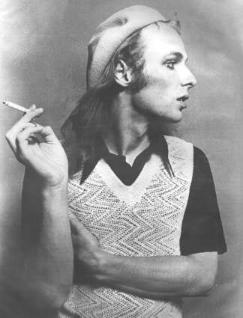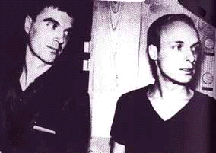 Musical genres sometimes alienate the listener from the artist. When an artist somehow transcends the status of being an artist and becomes a genre, sometimes the music is no longer the focal point but the person behind it is. Many producers of music have become genres in themselves, and one of the most influential and purely addictive genres is what I call Eno. Brian Eno, an original member of Roxy Music turned solo artist turned producer transcended the sounds of the ’70s progressive, glam and avante-garde scene. These three genres molded into one becoming the genre of Eno.
Musical genres sometimes alienate the listener from the artist. When an artist somehow transcends the status of being an artist and becomes a genre, sometimes the music is no longer the focal point but the person behind it is. Many producers of music have become genres in themselves, and one of the most influential and purely addictive genres is what I call Eno. Brian Eno, an original member of Roxy Music turned solo artist turned producer transcended the sounds of the ’70s progressive, glam and avante-garde scene. These three genres molded into one becoming the genre of Eno.It all started with Roxy Music, a glam band of the early ’70s hailing from Great Britain. The band’s unconvential sound, mixing horns, synthesizers and elaborate vocal arrangements were the springboard for Eno to pounce what could be done with popular music. Bending and twisting the sounds of his synthesizers, he made instruments make the noise of some different realm that no one else had ever heard. Roxy’s album For Your Pleasure is the first truly Eno album.
Brian Eno was not the only artist to be affected by his new approach to music making. Many of the greatest artists of the early ’70s sought out collaboration with the man. Robert Fripp of King Crimson would create an album of instrumental genius entitled No Pussyfooting that pointed at the direction Eno would take his later ambient music career. Mixing the sounds of Fripp’s guitar work and Eno’s pop music mentality, Eno recorded early solo albums that evolved the sounds into shorter pop songs that pointed towards the future of music. His first solo album Here Come the Warm Jets released in 1974took some of the feel of his work with Fripp and blended it with his experience in Roxy Music for a new pop sound that was far ahead of anything else that was being produced during this time.

With Eno behind the board of a production, an album would be sucked into his mind and warped into a masterpiece for some latter day ’70s artists. Notably first was David Bowie’s album Low which has instrumentals and short catchy fast-paced synth and guitar driven songs. The second half of the album takes on the darker ambient soundscapes the Eno would produce later in his career. He would also go on to produce Bowie’s albums Heroes and Lodger. The song “Heroes” itself has many Eno moments in it. The thing with his producing was not that he took over the music; rather he influenced the artist to take some of his thoughts on music and infuse it with their style. This made the late ’70s Bowie albums different from his early works, but very complex and beautiful albums that pointed to the future of music.
 Possibly the best of the Eno genre were the three albums Brian Eno produced for the Talking Heads. Starting with More Songs About Buildings and Food and ending with the magnum opus of Remain in Light, the repeating sounds, howling instruments and third-world beats came together to create pop music with a smart edge. With David Byrne, Eno found a like-minded genius who loved pop music and new musical territory. Songs like “Once in a Lifetime” by the Talking Heads are another sound that Eno influenced. For an adventurous listener, checking out Byrne and Eno’s My Life in the Bush of Ghosts, you will get an advanced taste of their two backgrounds in an album that broke musical boundaries.
Possibly the best of the Eno genre were the three albums Brian Eno produced for the Talking Heads. Starting with More Songs About Buildings and Food and ending with the magnum opus of Remain in Light, the repeating sounds, howling instruments and third-world beats came together to create pop music with a smart edge. With David Byrne, Eno found a like-minded genius who loved pop music and new musical territory. Songs like “Once in a Lifetime” by the Talking Heads are another sound that Eno influenced. For an adventurous listener, checking out Byrne and Eno’s My Life in the Bush of Ghosts, you will get an advanced taste of their two backgrounds in an album that broke musical boundaries.Saying all this shows how several artists were affected by a single person. Much like Phil Spector in the ’60s, Brian Eno created a sound for the ’70s that was ahead of its time and moved music into new territory. Bands of the ’90s and today take after the ideals of what Eno pushed in music. The band My Bloody Valentine’s album Loveless has the ethereal feel of an Eno album. Bands like Godspeed You Black Emperor! would take the ambient sound of Eno’s career and make albums that took after what Eno did with ambience. Radiohead and Grandaddy albums take a page of Eno’s sense of pop music mentality and futuristic sounds and themes to make accessible smart pop rock. Listen to Radiohead’s Kid A and Eno’s Another Green World and you will see what I mean.
Brian Eno became a genre by influencing music with his ideas. Although not fully mainstream, his function as artist and producer in the ’70s has made his music identifiable through specific sounds and styles. Artists that became bigger than his own solo work took on the elements of what he was doing with sound and instruments. Genre is defined by style and sound when it comes to music. Brian Eno has definitely transcended the gap between a genre label and his own artistry by becoming a genre in himself.
2 comments:
I will be requesting more material from this Mr. Eno when I come home during the summer. I'm quite intrigued.
I just saw Eraserhead for the first time last night and it got me thinking to your last post. Like Cronenberg, Lynch loves putting together disturbing images, but he does it randomly and interpretative. Cronenberg can make you feel very strange, but he keeps a linear story going and has a sense of humor. I didn't like it as much as Naked Lunch, and I think Cron needs more respect for taking Lynch-like creepy figures and using it in a real story. Your thoughts?
I definitely agree. Lynch is more about making films that aren't supposed to be understaood (at least, in my encounters with the oens I have seen... Eraserhead is on my Netflix currently.) He is more like a Jackson Pollack or a Contemporary filma artist where the strangeness in his movies is just there to be there. Like in Mullholand Drive when the two gals go to that theater and see the show where the guys voice is pre recorded and you think the woman is singing the beautiful opera song, but she isn't. It's all perception versus Cronenberg's ability to tell a story that is all about the freakish. Of cousre some of the weird shit in Cronenbergs films are supposerd to be symbols, but not all the time and not in Naked Lunch so much. They are both great, but similar and different in special ways.
Post a Comment